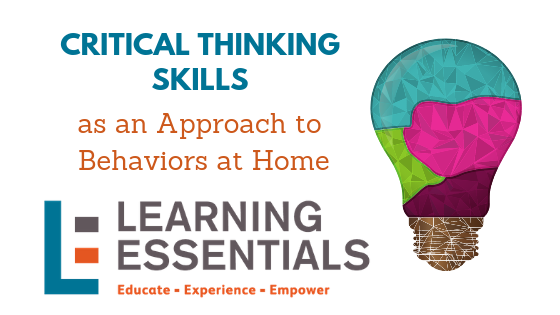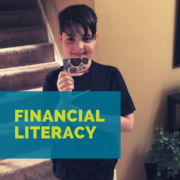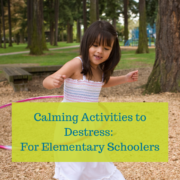Critical Thinking Skills as an Approach to Behaviors at Home
Especially as children become stir crazy cooped up inside during the winter months, behaviors can begin to plummet. Perhaps routines have been off, bedtimes have been extended, or one too many holiday desserts has sent someone into a tizzy. Whatever the case may be, we can always appreciate a fresh approach to dealing with misbehaviors. If time-outs, confiscated iPads, or groundings are wearing on the family, a different approach could be beneficial. With a little patience—okay, maybe a lot of patience—conversations where parents prompt children to think critically about their behaviors can change the way in which children see misbehaviors all together.
Critical thinking encompasses a complex set of higher order thinking skills. As opposed to memorization or fact-based knowledge, critical thinking includes relational, analytical, reflective, argumentative, or systematic thought processes. It is not so much what you know or think, but why or how you know and think that way. Because critical thinking often involves aspects of perspectives and/or decision making, these strategies can be the perfect platform for dealing with behavior management.
When siblings or peers argue:
- Parents can mediate by asking questions about how an argument began. By taking a moment for reflective thinking, children begin to see how a small issue may have escalated or blown out of proportion.
- If children are calling one another names, diffuse the situation by talking about how these are opinions; they are not based on facts. Just because someone calls you stupid certainly does not mean that you are stupid. These words hurt, of course, but ask your children why this person’s cruelness affects them; do you value this peer’s hurtful opinion?
- Encourage siblings to take the other’s perspective for a moment. Ask why she thinks her brother acted that way towards her. Why might his friend have behaved this way? The key is not so much in finding the exact purpose, but instead taking a moment to consider where that other person could be coming from.
- Ask about alternative responses for next time. Is there a better option for dealing with a conflict like this in the future? What is the best way to respond to your little brother next time this happens? What are we not going to do again, and why?
When “so-and-so’s parents” let them do A, B, or C:
- A rational explanation and some critical thinking can go a long way when children are upset over things that other kids are allowed to do. Calmly explain that everyone’s family operates differently, and so-and-so might be able to stay up until 10 pm simply because their parents work late… Or perhaps so-and-so sleeps in and rushes out the door every morning…Or it is possible that so-and-so feels like a walking zombie at the school most days? Whatever the scenario, remind your child that there are reasons behind your household routines—and another family’s routine is frankly irrelevant.
- Discuss the implications of these decisions. If a friend is allowed to see R-rated movies, but your children are not, explain how an inappropriate movie could make them scared, uncomfortable, worried, restless, sleepless, and ultimately cranky or sluggish at school. Help them connect the dots between the rules and their purposes so that they see these guidelines as meaningful, instead of arbitrary.
- Ask your child flat-out: “Besides the fact that so-and-so is allowed, do you have a valid reason or justification for changing the rules this time?” This forces children and teens to justify or support their stance with effective reasoning.
When frustrations boil over:
- Encourage children to take a beat to evaluate the situation—what can we do to potentially solve this problem or ease this frustration? Think about why this particular task is causing so much frustration and use that as a new point of entry.
- If math homework is about to cause a fit, take a brain break, walk away from the math packet, and cool down. Then, approach the problem with a cool head and fresh viewpoint. Think about it in “grand scheme of things” terms—is this something that is going to keep me up all night or ruin my month? Chances are, this meltdown will be a non-issue in a matter of hours.
- Help them break down the problem or situation and tackle the parts that they feel confident about. Remind them to apply what they know and then use those methods to chip away at the task.
- If the task is still complicated, encourage children to write down exactly what it is that they don’t know or are missing—what would they need to solve this problem or complete this assignment?
- Apply the skill to a simpler problem and use that momentum to approach the more complex problem. Oftentimes, in simplifying a question, we are better able to see aspects of the problem that we may have missed due to the complexity.
When problems are on the cusp or horizon:
- Call it psychic power or paternal/maternal observations, but parents are often able to tell when an issue, conflict, or temper is about to erupt. Teach children this reflective skill by modeling how to gauge one’s feelings and emotions. This helps to avoid or circumvent conflicts or attitudes that could be problematic.
- Discuss the concept of foresight and how such anticipation can help in our decision making. Remind children that everything they do has an impact or effect on those around them.
- In considering these implications, children are able to pause to consider the ripple effect that any decision might have. The ability to contemplate and deliberate based on past experiences and logical reasoning allows children to make more informed choices, and thus behave in more considerate or responsible ways.









